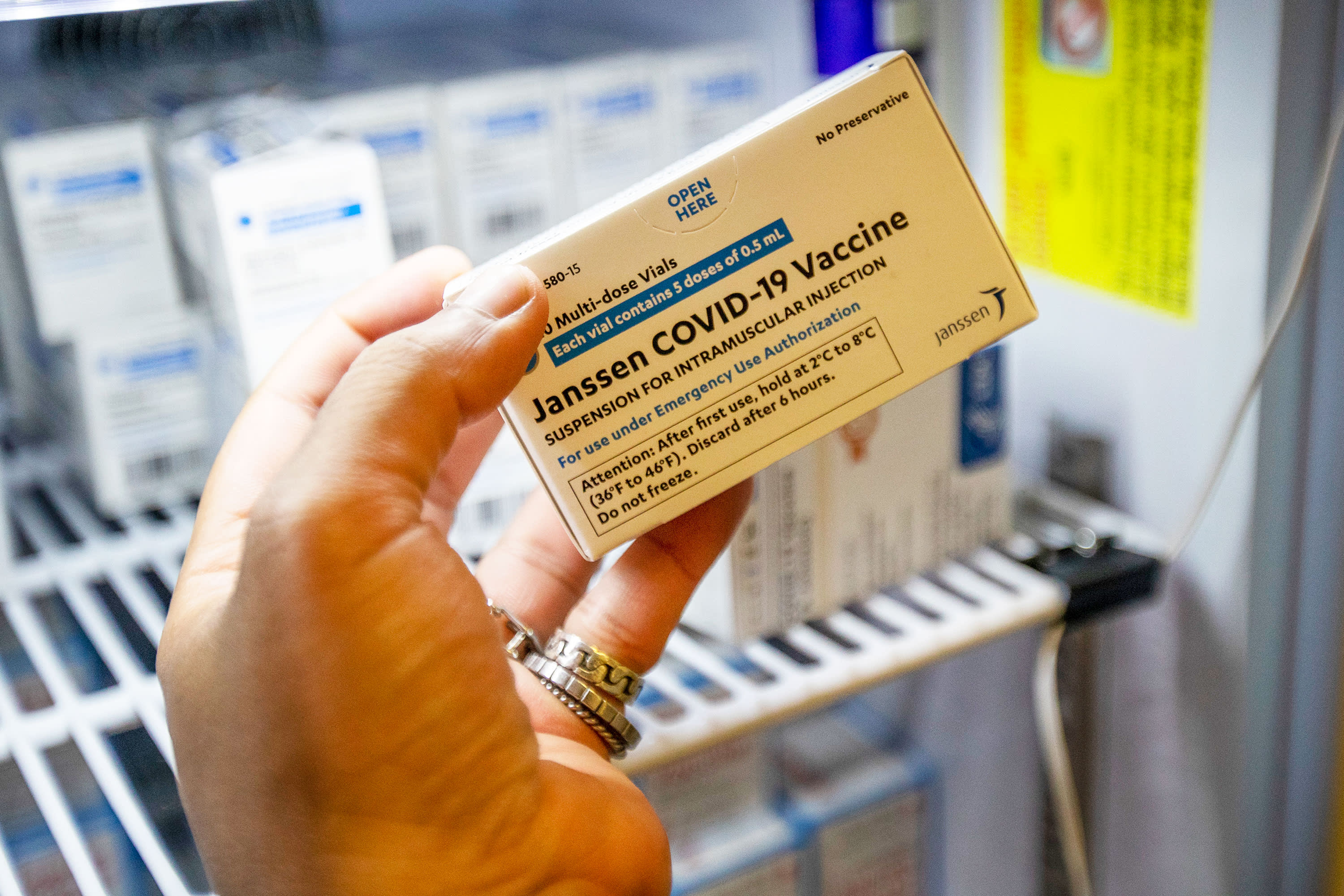FDA scientists strike favorable tone on J&J Covid booster shots ahead of vote this week

The staff of the Food and Drug Administration on Wednesday struck a more favorable tone on Johnson & Johnson Covid-19 booster shots, saying there may be a benefit to administering a second dose two months after the initial shot.
The staff acknowledged, however, the data to support boosters was limited and the agency hasn’t verified all the information yet.
“Although not independently confirmed by FDA from datasets, summaries of the data suggest there may be a benefit in a second dose administered approximately 2 months after the primary dose, when compared to the efficacy seen in the pivotal study COV3001,” they wrote in a 54-page document made public Wednesday.
They also said one J&J dose was consistently less effective than the mRNA vaccines made by Pfizer and Moderna in clinical trials and in real-world studies.
“The highest effectiveness estimates (including for more severe COVID-19 disease) across clinical trials and real-world effectiveness studies evaluating the Janssen COVID-19 Vaccine are consistently less than the highest effectiveness estimates for the mRNA COVID-19 vaccines,” they said.
Overall, data shows the single-shot J&J vaccine “still affords protection against severe COVID-19 disease and death in the United States.”
The report by FDA scientists is meant to brief the agency’s Vaccines and Related Biological Products Advisory Committee, which meets Friday to discuss data on the safety and effectiveness of a second J&J shot in adults. The documents published offer a glimpse of the agency’s view on additional shots.
Unlike Pfizer and Moderna’s two-shot mRNA vaccines, J&J hoped to offer a one-shot solution that would protect the public enough to help bring an end to the pandemic. But its protection at 72% in the U.S. was viewed by some as inferior to Moderna and Pfizer’s vaccines, which both touted efficacy rates above 90%.
A second dose of J&J’s shot boasts similar performance to the mRNA vaccines, boosting protection from symptomatic infection to 94% when administered two months after the first dose in the United States, according to company data released Sept. 21. J&J, which uses a modified adenovirus to induce an immune response, asked the agency to approve a booster shot of its one-dose vaccine for people ages 18 and older on Oct. 5.
Still, in the documents released Wednesday, FDA scientists suggested there wasn’t enough data on the older people or on the fast-moving delta variant to draw a conclusion on the benefit of boosters.
They said the sample size J&J provided on individuals age 60 and older “limits the ability to conclude about an increase in efficacy after the second dose in this group.”
“Finally, the small number of accused cases confirmed to be caused by the Delta variant precludes any conclusion regarding efficacy against the variant,” they added.
The staff said there was there were no new concerning safety issues observed after a second dose administered at two or three months following the first dose, but noted it is currently not known “if there will be an increased risk of these or other adverse reactions after” an additional dose.
The FDA advisory group is scheduled to discuss data on the safety and effectiveness of Moderna’s booster shot in adults on Thursday and J&J’s on Friday. The agency could make a final decision within days of the meetings, handing it off to the Centers for Disease Control and Prevention and its vaccine advisory committee to make their own decision, likely next week.
FDA scientists declined to take a stance on whether to back booster shots of Moderna’s Covid vaccine in an unusual move Tuesday, saying the data shows currently authorized vaccines still protect against severe disease and death in the U.S.
Last month, U.S. regulators authorized Covid booster shots of Pfizer and BioNTech’s vaccine to a wide array of Americans, including the elderly, adults with underlying medical conditions, and those who work or live in high-risk settings like health and grocery workers.
Norman Baylor, former director of the FDA’s vaccines office, said last week he wouldn’t have advised taking Moderna’s vaccine to an advisory committee because it uses a similar platform to Pfizer’s shot, which has already been authorized for boosters. However, J&J is different.
It “gets a little bit more tricky” because a second dose of J&J’s vaccine appears to boost “extremely well,” Baylor said. “Maybe it should have been a two-dose [vaccine] at the beginning.”
This is a developing story. Please check back for updates.




